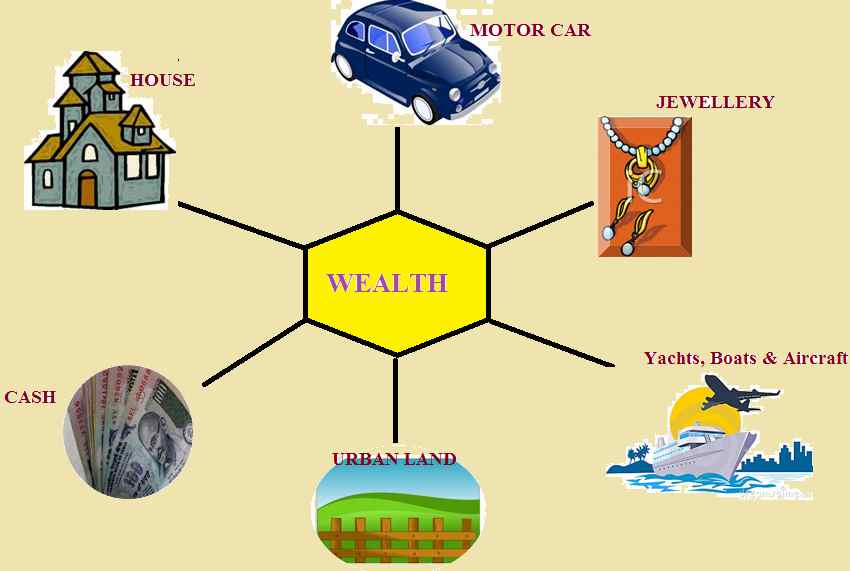Wealth tax in India is a part of direct taxes just like income tax. As Income tax is levied on the income you earn, Wealth tax in India is levied on wealth you have accumulated. As wealth itself is somewhat misinterpreted term so no middle class person calls itself wealthy and thus do not pay heed to wealth tax. But wealth has its own definition as per wealth tax act, 1957. This article is about understanding the basics of wealth tax in India , who should pay this and consequences of non-compliance.
Did you know: If you evade wealth tax payments, then tax authorities may impose penalty of upto 500% of the Tax amount sought to be evaded and in extreme cases imprisonment of upto 7 years can be imposed.
What is wealth tax in India?
Wealth tax in India is a tax levied on the specified unproductive assets in your assets/investment portfolio. Unproductive assets mean those assets which don’t generate any income (taxable or non-taxable). Like Jewellery, Land, Second house property which is not let out etc. If you are Indian national and resident as per tax laws, you will have to pay tax on your global assets too.
Every individual and HUF has to pay wealth tax @1% if the wealth exceeds Rs 30 lakh and file wealth tax return by 31st July immediately following the end of financial year. However date of filing return may vary in cases where the accounts are required to be audited. Also keep in mind that this tax is on per year basis.
What assets constitute wealth as per wealth tax in India?
Below are the assets details as defined as wealth under wealth tax act.
Basically wealth has been divided in 6 types – House, Motor cars, Jewelry, Air/Water vehicles and Land and even cash in excess of Rs 50,000/- . As I mentioned above that this tax is on unproductive assets. So if you have cash of Rs 2 lakh in hand and is not generating any return (taxable or non taxable) then this will be treated as your wealth and falls in the purview of wealth tax. All mutual funds, Fixed deposits, Exchange traded funds, Insurance policies etc. does not fall under wealth tax act. But,
- if you have second house which is not let out for 300 or more days then the value of that house becomes a part of your wealth, If you have farm house situated within 25 km of municipality limits then also it becomes your wealth,
- Motor cars if not being used for business purpose is a part of your wealth
- Jewelry includes jewelry, bullion, furniture, utensils, or any other article made up of gold, silver, platinum or any other precious metal, unless it is being used for business purpose and is a part of stock in trade. It does not include gold deposit bonds issued under gold deposit scheme.
- Yachts, Boats, Aircrafts if not being used for business purpose
- Urban land unless construction on that land is not permissible by law, or is held by assesse for industrial purposes for a period of 2 years from the date of acquisition
Do note that wealth tax is always levied on the net assets, which means that if any kind of loan was taken to buy that asset then that loan amount will be deducted from the total value of assets.
Also keep in mind that it also includes all those assets which are transferred by you to your wife, minor child or to son’s wife or any other person or association of person without any adequate consideration. ( Read : Tax planning Tips )
Do NRIs also have to pay wealth tax in India?
Yes, NRIs are also subject to wealth tax for the Assets purchased in India. However, there’s one exception here. If NRIs are coming back to India for good, bring along with some assets or purchase the assets as defined in the wealth tax act from the money they brought from the country of their residence, that money and purchases are exempt from this law. But the condition is that they have to make the purchases within 1 year prior to the date of return/comeback or at any time thereafter. The exemption is available for 7 successive assessment years from the date of return to India.
Valuation of Assets and Computation of wealth tax in India
Valuation date for Assets comes under wealth tax purview is the last day of previous year i.e 31st March. Here’s how you can compute your wealth tax:
| Details | Amount | |
| A | Value of Assets belonged to Assesse ( including those given to family members without adequate consideration) | – |
| B | Assets exempted under Wealth tax act | – |
| C | Gross wealth (A-B) | – |
| D | Debts/Loans belonged to Assets under Gross Wealth | – |
| E | Net Wealth (C-D) | – |
| F | Exemption Limit | 30 lakh |
| Wealth Chargeable to Tax @ 1% (E-F) | – |
Conclusion:
As they say ignorance is no excuse and this applies to Wealth tax also. If you think that you fall under the purview of wealth tax but have been avoiding or evading just under the pretext of ignorance, then get up and do the calculations as per the table above , You may take a professional help who may also help you in some tax planning and reduction in your tax liability.
Hope you find this article on wealth tax in India useful. Do share you views.







 Manikaran Singal is the founder and Chief financial planner at Good Moneying Financial Solutions. He is a CERTIFIED FINANCIAL PLANNER CM and SEBI registered Investment adviser (Regd no. INA 100001620). He’s having 20+ years of experience in financial services space.
Manikaran Singal is the founder and Chief financial planner at Good Moneying Financial Solutions. He is a CERTIFIED FINANCIAL PLANNER CM and SEBI registered Investment adviser (Regd no. INA 100001620). He’s having 20+ years of experience in financial services space.


We are working couple, and for the past 15years, we were paying taxes, filing returns, and we still have another 12 years of work, salaries will be added, saving under all sections available, paying the annual taxes on salaries.
The point is, the amount saved for the past 15 years, and the next twelve years is being simply getting added and added, getting a compounding effect. My estimation is that it is now around Rs.75Lakhs and for the next 12 years, this amount as well as the future additions is going to be around Rs.4Crores, which we want to handover to our only son.
The question is what is the tax treatment of this amount?
Am I doing any mistake? Violating any tax laws?
We do not own a house, and would continue to stay in a rented house. After retirement and handing over this amount to our son, in which ever way he decides, we would like to live on our pension, continuing to stay on rent , AS LONG AS WE LIVE!
Please suggest
Since you said each person can be exempted from wealth tax upto Rs30Lakhs, I can show Rs.30L against each of our PAN cards, but what happens to the accrued interests? How they are taxed? Shares are not taxable,but risky, mutual funds, efts….. How to make use of them.
Mr Murty…don’t worry. You are not violating any law. You are already paying taxes on your income and also have parked your savings in the instruments which are generating returns (taxable or non taxable)
Wealth tax as i specifically mentioned in the article is levied on those assets which are unproductive i.e which generates no return. so if you have any of those assets and the total value of which exceeds 30 lakh then yes, you need to pay wealth tax.
Hello, I had bought a house in 2012 and just bought a second house in 2014. Both the homes have outstanding loan on it. The first house is given on rent since last two years and we (I, my husband and child) will soon be moving in the second house to live. Currently we live in joint family jointly owned by my husband and his father.
Please clarify if I or my husband fall under the bracket of wealth tax?
Smita, if the ownership of second house is same and is not self occupied or let out for more than 300 days in the FY for which you are calculating taxation for, then definitely it comes under wealth tax net purview for the value greater than Rs 30lakh.
It is better if you consult your CA or tax lawyer while filing Income tax return
I have purchased asecond house on29/07/2014 and given it on rent w.e.f. 01/08/2014. please let me know whether the cost of second house is taxable as on 31.03.2015(valuation date) as the same is let out for less than 300 days during the F.Y.2014-15
Mr Bhandari, technically the answer is yes. If the second property is not let out for more than 300 days in a financial year, wealth tax provisions will apply.
Sir,
I recently constructed a flat in may land under Joint venture. in Chennai. The builder will take 3 flats and I will get 3 flats of the total 6 flats. I have let out on rent my 3 flats. Please let me know what is the procedure as per wealth tax. I am employed and paying my tax regularly.
Pls advice.
regards,
Suresh
Suresh …wealth tax has been abolished from this year i.e.FY 2015-16
Sir,
my mother inherited a house. It is currently valued at 15 crores. What is the wealth tax she needs to pay and the frequency of payment.
Regards,
Rohit
Wealth tax is no longer applicable w.e.f AY 2016-2017
Sir,I am a state gov’t employee paying tax regularly.1 year ago my father expired,so after 5 months me and my mother gave our house to my younger brother who is unmarried by proper documentation.for which in return my brother deposited 15 lacks in my salary account which is mentioned in the document.I don’t have any other wealth.so should I have to pay tax?if so how much should I pay.kindly guide me sir.
I think it all depends on the documentation you have done. This transaction can be treated as a Gift with no tax liability on both sides. But if you have executed a sale deed then it might be treated as a taxable sale. I think you should consult a tax expert in your area.
Sir, i have a residential property which we are planning to sell it out, the opposite party is giving us full cheque payment, the worth is 1.35 cr, what is the tax and all i will have to pay
Aditya you need to work out the capital gains earned in the transaction. Since it is a property transaction and if it is a long-term capital gain, then you can save tax by buying capital gain bonds or another residential property. http://www.goodmoneying.com/financial-planning/save-capital-gain-tax-sale-property-section-54-54ec-54f-income-tax-act